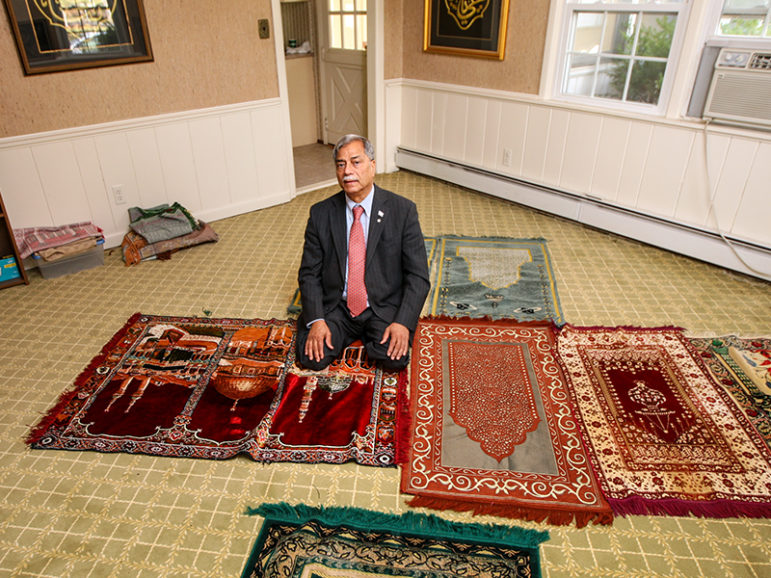A New Year’s Eve court ruling against Bernards Township, N.J., for its rejection of a proposed mosque means officials could face a million-dollar judgment if they appeal and lose, said an expert in federal law.
U.S. District Court Judge Michael Shipp’s decision against the township was a victory for the Islamic Society of Basking Ridge, whose plan to build a mosque on a 4-acre lot in Liberty Corner went through more than three years of hearings before being rejected.
The township’s core reason for denying the application was parking: The planning board said that because the peak time for prayer would be Friday afternoons, the mosque’s congregants would be coming straight from work, not carpooling. Therefore, the mosque required more parking spaces than a Christian church would, the lawsuit said.
But imposing different requirements on one religion because of its worship schedule was a clear violation of the Religious Land Use and Incarcerated Persons Act (RLUIPA), a law signed in 2000 to protect religious liberties, Shipp ruled.
Robert Tuttle is a Professor of Law and Religion at George Washington University School of Law, and the co-author of “Secular Government, Religious People.” He offered his insights into the Bernards case:
Township officials say they are mulling an appeal. Your thoughts?
The town is taking a very risky gamble if it wants to appeal this decision because I can’t imagine any federal Court of Appeals being especially sympathetic to the township’s case. The RLUIPA statute provides significant protections to houses of worship. In particular, it prohibits a city from applying different land use standards to different faith groups, and that is the core of the district court’s opinion.
If the township appeals, I wouldn’t be surprised to see a five-page opinion from the Appeals Court that ends with “Affirmed.” Based on the facts found in the district court opinion, I can’t imagine defending the town’s actions, much less allowing them to continue for so long.
Is there harm in trying?
The big deal about RLUIPA suits is if the congregation prevails, it is entitled to reasonable attorney fees. And that’s where towns often get hammered. The cost of litigating a hotly contested case through to an appeal can easily get close to a million dollars. That’s one of the biggest things you have to consider as a town when you face a land use decision involving a religious organization. The township right now is on the hook.
What about awarding damages?
One good analogy is to imagine you bought a house and you show up, but a policeman is there and says you can’t occupy this house because of your faith, or your color. You’ve got this house, but they say you can’t live there. That means you have the cost of maintaining the land, maybe a mortgage, plus you have to pay to live someplace else.
In this case, the mosque will still have to prove they suffered an injury, but because they’re paying for property they can’t use, it’s hard to see how they haven’t been harmed by that financial loss.
The township argued that the RLUIPA law strips its planning board of all power. Is that the case?
No, the law does not strip planning boards of all power. Towns and cities have prevailed in a number of RLUIPA lawsuits. That said, it does require planning boards to be very sensitive when handling proposals by religious organizations. The board might need to set aside some requirements they believe would be better for the community. Instead, they have to prove the proposal would be much worse for the community.
We see this a lot in historic preservation districts: Although churches are not completely exempt from historic preservation rules, a town would need to be very flexible in negotiating with a church about how best to preserve the historic character while still allowing the church to make changes it believes necessary for its worship life.
What’s the worst-case scenario for Bernards Township?
The worst case is that the township continues to deny the Islamic Center’s request for permission to use the property, and the district court enters a final judgment requiring the township to grant the Islamic Center the necessary permits. If the township appeals, the U.S. Court of Appeals for the Third Circuit might say, ‘Hold on, don’t start building it, let’s keep the status quo until we decide this.’
And if, as I strongly suspect, the Third Circuit upholds the district court decision, the township’s liability for damages and attorneys fees would have been growing all along.
In parallel cases, damages and attorney fees have run to several million dollars.
What happens if the town wins on appeal?
Then they don’t owe anyone anything, because they haven’t done anything wrong. But it’s hard for me to see a decision in their favor based on these facts.
Is there any chance this New Jersey case could go to the U.S. Supreme Court and produce a truly landmark ruling?
No. There is no split in rulings at the Courts of Appeal level. The Supreme Court isn’t going to take this case.
(Kathleen O’Brien writes for NJ Advance Media. She may be reached at [email protected]. Follow her on Twitter @OBrienLedger)





